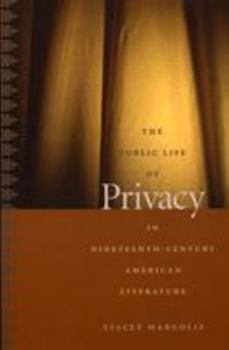The Public Life of Privacy in Nineteenth-Century American Literature
Select Format
Select Condition 
Book Overview
Margolis provides readings of fiction by Hawthorne and James as well as Susan Warner, Mark Twain, Charles Chesnutt, and Pauline Hopkins. In these writers' works, she traces a distinctive novelistic tradition that viewed social developments-such as changes in political partisanship and childhood education and the rise of new politico-legal forms like negligence law-as means for understanding how individuals were shaped by their interactions with society. The Public Life of Privacy in Nineteenth-Century American Literature adds a new level of complexity to understandings of nineteenth-century American culture by illuminating a literary tradition full of accidents, mistakes, and unintended consequences-one in which feelings and desires were often overshadowed by all that was external to the self.





